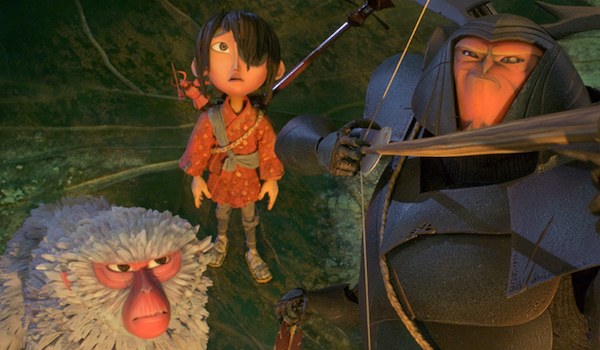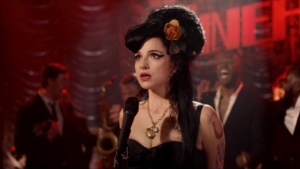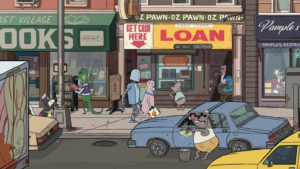Reviewed by GREG KING
Director: Travis Knight
Stars: voices of Charlize Theron, Matthew McConaughey, Art Parkinson, Ralph Fiennes, Rooney Mara, Brenda Vaccaro, George Takei, Cary-Hiroyuki Tagawa.

This stop motion animated action adventure comes from Laika Studios, and maintains the high standards established by their previous works like Coraline and Paranorman. Set in a mythical Japan during the era of the Samurai, the film draws upon the traditions and culture of ancient Japan, including the Kabuki theatre, origami, samurai legends and anime comics.
Written by Marc Haimes and Chris Butler (Paranorman, etc), the film explores some universal themes like family, good versus evil, grief, death, revenge, sacrifice, memories, the power of stories, and epic quests, which will resonate with audiences of all ages. However there is a dark tone to the material, and some scenes will be a little too intense and scary for younger audiences.
When he was born, Kubo (voiced by Art Parkinson, from Game Of Thrones, Dracula Untold, etc) had his eye plucked out by his evil, malevolent grandfather Raiden (voiced by Ralph Fiennes), known as the sadistic spirit the Moon King. His mother fled with Kubo and hides out in a seaside cave. Kubo now cares for his invalid mother, who remains in a catatonic state for much of the time but who also suffers from moments of lucidity when she talks fondly of his father the legendary warrior Hanzo. Every day Kubo ventures into the nearby village where he plays his shamisen, a banjo-like musical instrument, and tells stories to a captivated audience in the village square. His stories tell of a legendary samurai warrior who fights horrible monsters, with the aid of complex origami figures that magically seem to come to life.
But after he stays out late one night he is seen by evil spirits working with his grandfather. Kubo must go on a quest to find a suit of armour, an unbreakable sword and a helmet to protect himself and save the world. His companions on this quest are a giant but dimwitted warrior beetle (voiced by Matthew McConaughey) and a snow monkey (voiced by Charlize Theron).
Kubo And The Two Strings is the first feature film directed by Travis Knight, a former animator and the CEO of Laika Studios, and it is a film rich in detail, with colourful animation. Superb technical craftsmanship has brought this fantasy world and these wonderful characters to life. The film delivers some eye popping visuals and some quirky humour, but there is also a melancholy tone that permeates the material. The computer rendered stop-motion animation is beautiful, and the way origami figures are cleverly brought to life is quite spectacular. There are some superb technical effects, including a six-metre tall fearsome skeleton puppet! During the end credits there is a brief sequences that shows some behind the scenes footage of the how the filmmakers created this giant skeleton monster.
Knight has assembled a strong voice cast, but the casting of Caucasian actors in the lead roles has caused some controversy. But this has become a norm of Hollywood, with other Asian themed animated films like Mulan and the Kung Fu Panda series also using non-Asian actors in the lead roles and is not a serious problem. And even the English language versions of many Studio Ghibli productions have used non-Asian vocal casts. George Takei (of Star Trek fame) and veteran Cary-Hiroyuki Tagawa have small roles.
Parkinson brings a wonderful mix of innocence and resilience to his reading of the title character. McConaughey is very funny here, and provides the comic relief with his performance as the dimwitted beetle, a former samurai warrior cursed to resemble a giant bug. The comic banter and byplay between his character and Theron’s adds to the movie’s pleasures. Theron also does double duty by providing the voice of Kubo’s troubled mother. Rooney Mara voices the pair of evil spectral sisters, while Fiennes’ performance as the demonic and vengeful villain of the piece will remind many of his work as the evil Voldemort in the Harry Potter series.
Dario Marianelli’s evocative score enhances the emotional and involving storytelling, while a moving rendition of The Beatles’ hit While My Guitar Gently Weeps proves an effective closing song for the final credits.
★★★



